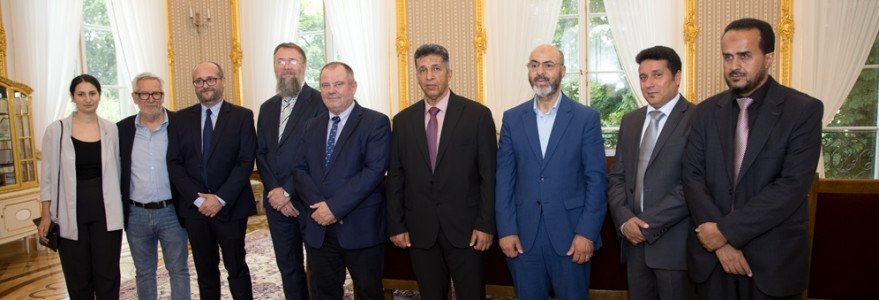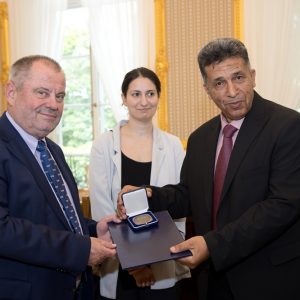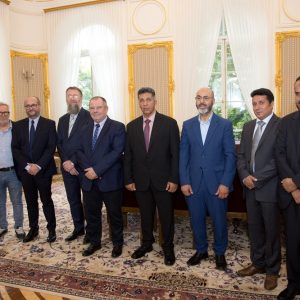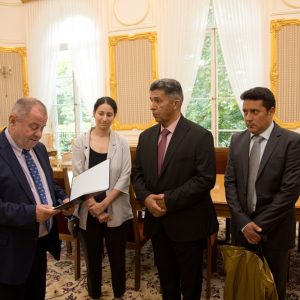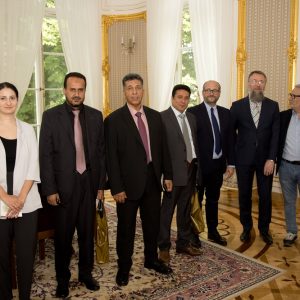On 20th May, Prof. Alojzy Z. Nowak, the Rector of the University of Warsaw, honoured Dr Mohamed Faraj Mohamed Alfaloos, the Chairman of the Department of Antiquities of Libya in Tripoli, with the UW Medal. The award was given for sustaining the long-standing archaeological cooperation between Libyan and Polish researchers, including those from the University of Warsaw.
In May, the University of Warsaw hosted a delegation from the Department of Antiquities of Libya in Tripoli. The visit was related to the resumption of excavations carried out by the University of Warsaw in Ptolemais after a thirteen-year suspension forced by the outbreak of civil war in Libya.
“On behalf of the entire community of the University of Warsaw, I would like to honour you with the UW Medal, which was unanimously awarded for all you have done to sustain Libyan-Polish research cooperation. We are proud to have such an excellent partner. The doors of our University are open to Libyan students, doctoral candidates and employees,” Prof. Alojzy Z. Nowak, the UW Rector, said presenting the university award to Dr Mohamed Faraj Mohamed Alfaloos, the Chairman of the Department of Antiquities.
Dr Mohamed Faraj Mohamed Alfaloos has provided administrative support to the University since the beginning of the University of Warsaw’s presence in Libya (2001) on many occasions, enabling the implementation of successive excavation seasons in the field. In 2022, while heading the Department of Antiquities of Libya in Tripoli, he took the initiative to re-invite archaeologists from the University of Warsaw to the prestigious site of Ptolemais and renewed the excavation concession.
“It is a great honour for me to be awarded the UW Medal. We are very happy about the archaeological research in Libya, which started in 2001. We are proud that such an important institution as the University of Warsaw is conducting excavations in our country. UW’s achievements motivate us to continue our cooperation with the University,” Dr Alfaloos said.
The ceremony was also attended by: Mohamed Hashem, the Office Director of the Libyan Department of Antiquities in Tokra, Faraj Tahir, the Office Director of the Libyan Department of Antiquities in Ptolemais, Prof. Arkadiusz Sołtysiak, the Vice-Dean of Research and Development at the UW’s Faculty of Archaeology, Dr Piotr Jaworski, the head of research of the UW’s archaeological works in Ptolemais, Dr George Yacoub, Arabist and archaeologist, member of the Polish Archaeological Mission to Ptolemais, Amer Karema, First Secretary of the Embassy of Libya, Shamani Yacoub, Arabist and translator, and Dr Miron Bogacki from the UW’s Faculty of Archaeology.
Ptolemais
Ptolemais is one of the largest ancient Greek cities, founded by the Egyptian kings of the Ptolemaic dynasty who ruled Cyrenaica in the 3rd century BC. The city existed until the Arab conquest in the 7th century AD and rose to prominence as the capital of a Roman province during late antiquity. At the same time, Ptolemais is a city that has not been covered by modern buildings. This allows archaeologists to study various aspects of the ancient city and the lives of its inhabitants using a range of scientific methods.
Archaeological research at Ptolemais, initiated by Prof. Tomasz Mikocki (1954–2007) and carried out between 2001 and 2010, has contributed to numerous internationally renowned discoveries, including the discovery of the House of Leukaktios, a private residence from the Roman period, richly decorated with mosaics and wall paintings.
More information about research at the site is available on the website of the Polish Archaeological Mission in Ptolemais >>



